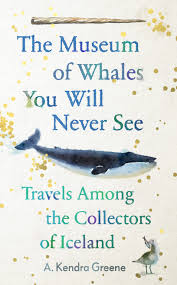A Kendra Greene: The Museum of Whales You Will Never See review - a thoughtful museum piece | reviews, news & interviews
A. Kendra Greene: The Museum of Whales You Will Never See review - a thoughtful museum piece
A. Kendra Greene: The Museum of Whales You Will Never See review - a thoughtful museum piece
The idiosyncratic character of a nation, captured by collectors

The Museum of Whales is an unfolding: a slow process of describing a country, its people, and its past through its esoteric and bizarre museums. The book is structured into galleries and cabinets, like the museums it describes, and the text is accompanied by often mysterious line drawings with their own key at the end.
However, until about halfway through The Museum of Whales You Will Never See, A. Kendra Greene's book feels a little frustrating. The introduction (‘Arrival’) is slight, fairly vague, and gives scant summary of the purpose of the text. This feeling is emphasised by the book itself, which is dilatory and often tangential, but far from being an irritation, this emerges as one of the book's great strengths. As Greene herself explains: “Because not just here but always, something happens at the edges”.

Museums are odd places, presenting a summation of their subject through a limited number of objects. No amount of radical reinventions and thoughtful text and interpretation can change that fact. Greene focuses on these museums’ idiosyncrasies, particularly notable given that all of the places that she describes were opened by lay persons, not the government. Each institution speaks about the curator and their community; and through these, Greene gives a very good history of Iceland, from its brutally tough beginnings to the affluence of the present day. Her dilatory narrative is, again, of benefit here, as this information is spread out enough as to never feel obtrusive. It also becomes (without sounding cliched) a history of a country told through its people – arguably one of the main purposes of a museum. Greene also has an admirable lightness of touch when she demonstrates what is not included in these institutions – what is always lost in the obsolescence-lacunae between the use of a thing and its memorialisation, when it is just junk in someone’s attic.
If Greene’s book has a downside, it is that, as with a lot of other publications like The Museum of Whales, she has a tendency to make grand or dreamy statements that are a bit too sincere. There is a fair amount of museum theory thrown in, which doesn’t feel tokenistic, but can sometimes also feel a bit pat, or too neat. At the same time, her grand calls to action become necessarily urgent, as she describes how climate change has affected Iceland, as it has the rest of the world.
- The Museum of Whales You Will Never See by A. Kendra Greene (Granta, £14.99)
- Read more book reviews on theartsdesk
The future of Arts Journalism
You can stop theartsdesk.com closing!
We urgently need financing to survive. Our fundraising drive has thus far raised £49,000 but we need to reach £100,000 or we will be forced to close. Please contribute here: https://gofund.me/c3f6033d
And if you can forward this information to anyone who might assist, we’d be grateful.

Subscribe to theartsdesk.com
Thank you for continuing to read our work on theartsdesk.com. For unlimited access to every article in its entirety, including our archive of more than 15,000 pieces, we're asking for £5 per month or £40 per year. We feel it's a very good deal, and hope you do too.
To take a subscription now simply click here.
And if you're looking for that extra gift for a friend or family member, why not treat them to a theartsdesk.com gift subscription?
more Books
 'We are bowled over!' Thank you for your messages of love and support
Much-appreciated words of commendation from readers and the cultural community
'We are bowled over!' Thank you for your messages of love and support
Much-appreciated words of commendation from readers and the cultural community
 Frances Wilson: Electric Spark - The Enigma of Muriel Spark review - the matter of fact
Frances Wilson employs her full artistic power to keep pace with Spark’s fantastic and fugitive life
Frances Wilson: Electric Spark - The Enigma of Muriel Spark review - the matter of fact
Frances Wilson employs her full artistic power to keep pace with Spark’s fantastic and fugitive life
 Elizabeth Alker: Everything We Do is Music review - Prokofiev goes pop
A compelling journey into a surprising musical kinship
Elizabeth Alker: Everything We Do is Music review - Prokofiev goes pop
A compelling journey into a surprising musical kinship
 Natalia Ginzburg: The City and the House review - a dying art
Dick Davis renders this analogue love-letter in polyphonic English
Natalia Ginzburg: The City and the House review - a dying art
Dick Davis renders this analogue love-letter in polyphonic English
 Tom Raworth: Cancer review - truthfulness
A 'lost' book reconfirms Raworth’s legacy as one of the great lyric poets
Tom Raworth: Cancer review - truthfulness
A 'lost' book reconfirms Raworth’s legacy as one of the great lyric poets
 Ian Leslie: John and Paul - A Love Story in Songs review - help!
Ian Leslie loses himself in amateur psychology, and fatally misreads The Beatles
Ian Leslie: John and Paul - A Love Story in Songs review - help!
Ian Leslie loses himself in amateur psychology, and fatally misreads The Beatles
 Samuel Arbesman: The Magic of Code review - the spark ages
A wide-eyed take on our digital world can’t quite dispel the dangers
Samuel Arbesman: The Magic of Code review - the spark ages
A wide-eyed take on our digital world can’t quite dispel the dangers
 Zsuzsanna Gahse: Mountainish review - seeking refuge
Notes on danger and dialogue in the shadow of the Swiss Alps
Zsuzsanna Gahse: Mountainish review - seeking refuge
Notes on danger and dialogue in the shadow of the Swiss Alps
 Patrick McGilligan: Woody Allen - A Travesty of a Mockery of a Sham review - New York stories
Fair-minded Woody Allen biography covers all bases
Patrick McGilligan: Woody Allen - A Travesty of a Mockery of a Sham review - New York stories
Fair-minded Woody Allen biography covers all bases
 Howard Amos: Russia Starts Here review - East meets West, via the Pskov region
A journalist looks beyond borders in this searching account of the Russian mind
Howard Amos: Russia Starts Here review - East meets West, via the Pskov region
A journalist looks beyond borders in this searching account of the Russian mind
 Henry Gee: The Decline and Fall of the Human Empire - Why Our Species is on the Edge of Extinction review - survival instincts
A science writer looks to the stars for a way to dodge our impending doom
Henry Gee: The Decline and Fall of the Human Empire - Why Our Species is on the Edge of Extinction review - survival instincts
A science writer looks to the stars for a way to dodge our impending doom
 Jonathan Buckley: One Boat review - a shore thing
Buckley’s 13th novel is a powerful reflection on intimacy and grief
Jonathan Buckley: One Boat review - a shore thing
Buckley’s 13th novel is a powerful reflection on intimacy and grief

Add comment